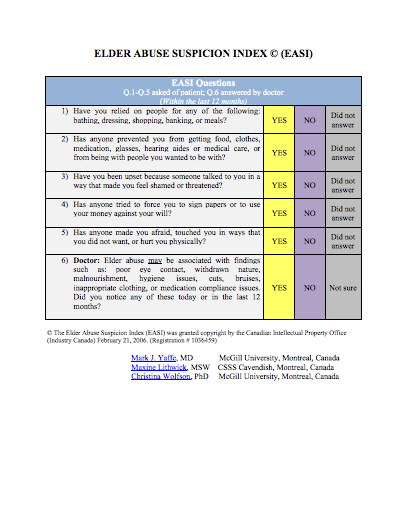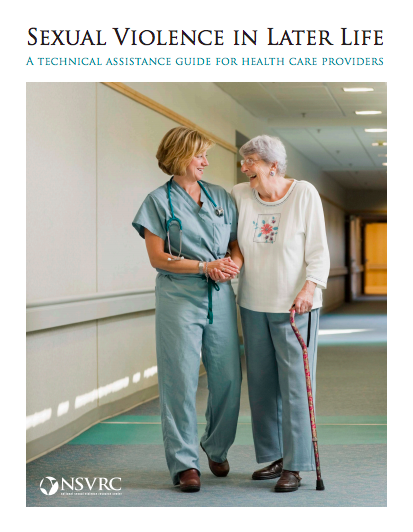"Under grant support from CIHR the EASI was developed and validated in English and French by an interdisciplinary team affiliated with McGill University to help family physicians detect those in their practices who are victims of elder abuse. Since mistreatment and neglect of older adults is a complex phenomenon with a multitude of suggested risk factors, a number of theories as to its etiology, and a broad range of physical or psychological manifestations, the EASI was not designed to be a screening tool in the traditional sense. Rather, the EASI respects doctors’ decision-making and diagnostic strategies that commonly involve indices of suspicion. It therefore aims to raise a doctor’s level of suspicion about elder abuse to a level at which the physician himself or herself makes in-depth exploration or asks permission of the patient to refer her or him for specialized evaluation by social service workers, adult protection workers, or specially trained police.
The EASI was validated for enquiry by family physicians of patients in their offices aged 65 and over, with a Folstein MMSE score of 24 or above. The EASI is comprised of only six questions and is rapid to administer. The first five are asked by the doctor and answered by the patient in a YES / NO format. The sixth question is answered by the doctor, based on his or her observaitons of the patient. In the majority of cases EASI completion takes about two minutes to do; maximum reported time is five minutes."
Access the EASI tool in 16 other languages here
Source: McGill University
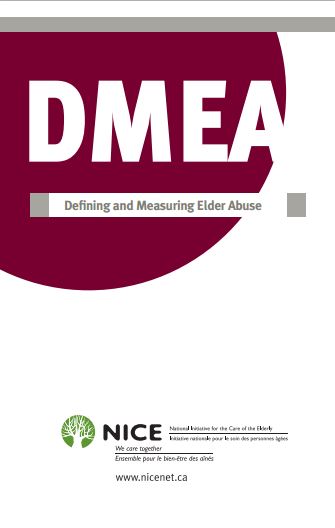
“Mistreatment of older adults refers to actions/behaviours or lack of actions/behaviours that cause harm or risk of harm within a trust relationship.”
The following is part of our project “Increasing Access to Justice for Older Adult Victims of Sexual Assault: A Capacity Building Approach”, funded by the Justice Canada Victims Fund.Learn more about this project or consult the full list of resources
"The purpose of this guide is to assist physicians, nurses, and other clinical health care providers in meeting their professional obligations in identifying and providing intervention and treatment to older victims of sexual violence. It includes introductory information, such as definitions and a problem statement, as well as scenarios. Additionally, it discusses issues relevant to health care providers, such as practice recommendations, provider responsibilities, gathering patient history, examination, and evidence collection."
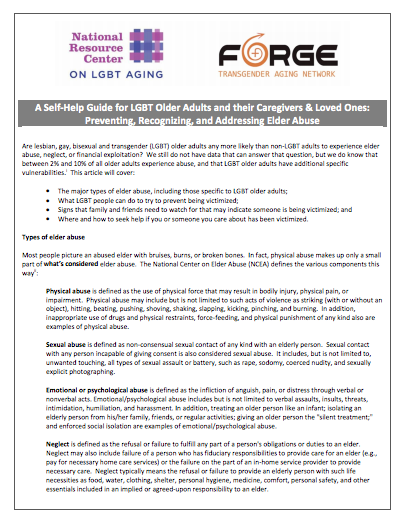 "[W] e do know that between 2% and 10% of all older adults experience abuse, and that LGBT older adults have additional specific vulnerabilities."
"[W] e do know that between 2% and 10% of all older adults experience abuse, and that LGBT older adults have additional specific vulnerabilities."
This comprehensive article, written for for LGBT older adults and their loved ones, discusses warning signs for LGBT elder abuse. The article covers such topics as financial abuse, threats of "outing" and isolation, among others. It also provides resource suggestions.
Source: FORGE Transgender Aging Network (USA); National Resource Center on LGBT Aging (USA)
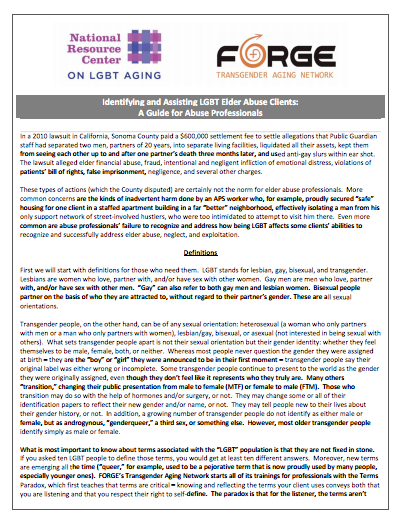 “For the most part, LGBT older adults experience the same types of abuse as non-LGBT elders. However, there are additional ways LGBT older adults can be victimized and more reasons why LGBT older adults may 'accept' this victimization.”
“For the most part, LGBT older adults experience the same types of abuse as non-LGBT elders. However, there are additional ways LGBT older adults can be victimized and more reasons why LGBT older adults may 'accept' this victimization.”
This comprehensive article, written for abuse professionals, discusses warning signs for LGBT elder abuse. The article covers such topics as financial abuse, threats of "outing" and isolation, among others. It also provides resource suggestions.
Source: FORGE Transgender Aging Network (USA); National Resource Center on LGBT Aging (USA)
Page 26 of 31


